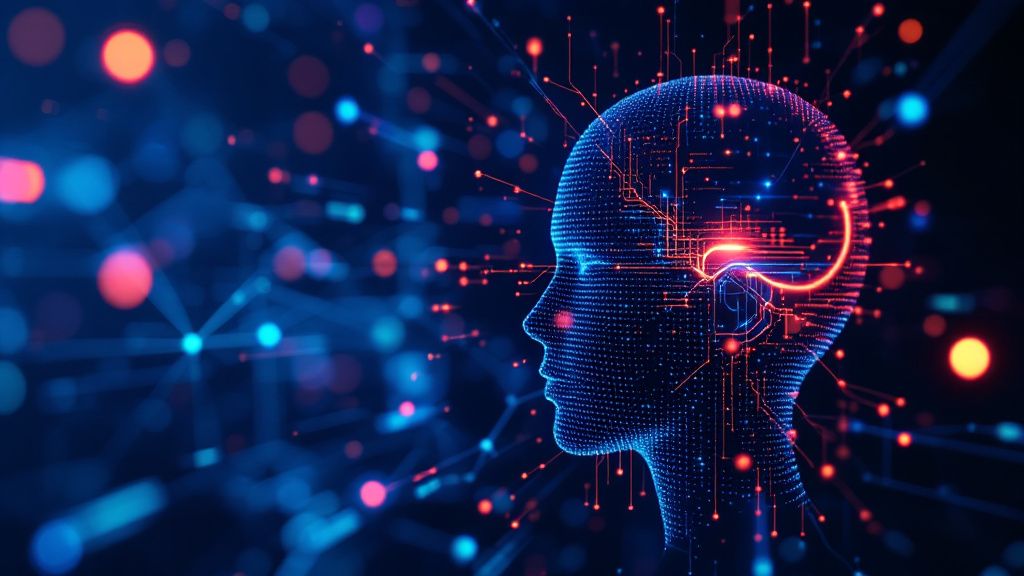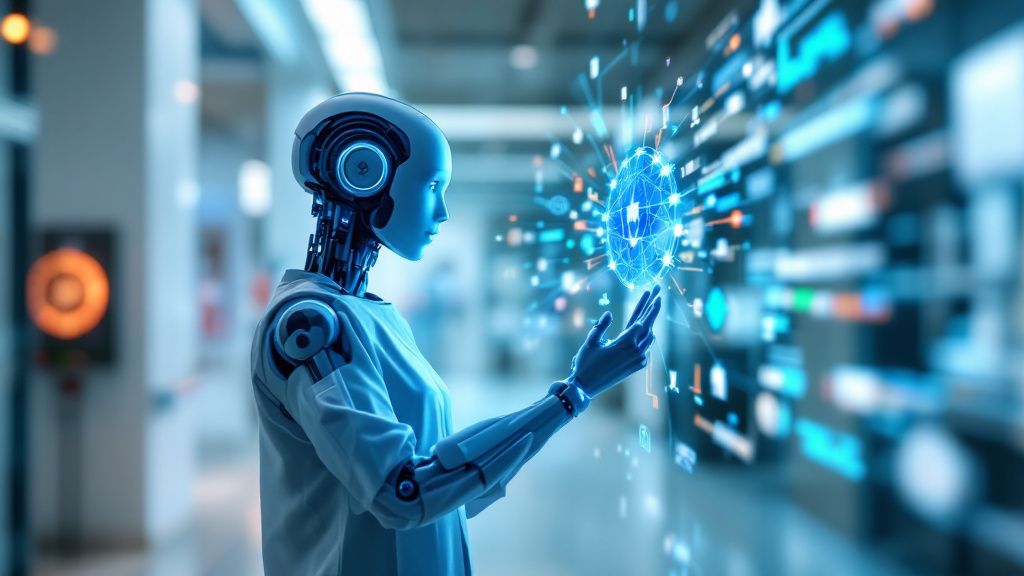Exploring the Wonders of Artificial Intelligence
Imagine stepping into a world where machines possess human-like intelligence, allowing them to perform tasks that once seemed impossible. In the burgeoning landscape of artificial intelligence, marvels abound, reshaping the way you perceive technology. From virtual assistants that understand your needs almost intuitively to sophisticated algorithms that predict your future decisions, AI is everywhere. You witness its impact across various sectors, transforming industries by enhancing efficiency and innovation. Whether it's the rapidly evolving future of artificial intelligence or its potential role in everyday solutions, the wonders of AI are boundless, offering a glimpse into tomorrow. It's particularly exciting when thinking about how AI for business can revolutionize processes, making them more agile and responsive. The journey of implementing AI in business is ongoing, promising to redefine how operations are strategized and executed, heralding a tech-driven evolution that continues to fascinate and inspire.

Understanding the Basics of AI
Artificial intelligence is a technological marvel that simulates human intelligence through learning, reasoning, and self-correction. Within the realm of AI, machines absorb vast amounts of data to perform tasks with accuracy. You might be familiar with AI applications like language processing, where computers understand and generate human language, offering you a glimpse into its practical uses and incredible potential.
Deep learning, a subset of machine learning, utilizes neural networks that mimic the human brain. According to recent studies, these networks explain how machines achieve tasks like recognizing speech and identifying images, enhancing AI's accuracy and efficiency. Such scientific explanations help demystify AI, making it accessible for practical applications you encounter daily.
Implementing AI in business opens doors to increased productivity. By automating routine tasks, businesses can allocate more resources to strategic operations. This enhanced capability showcases the transformative power of AI for business, illustrating how integration can lead to sustainable development and growth without stagnating in repetitive workflows.
The future of artificial intelligence holds boundless potential, with advancements continually reshaping technology. As AI becomes more integrated into society, understanding its basics will empower you to appreciate its impact on modern life, from augmented services to groundbreaking innovations that lead us towards an efficient and intelligent future.

The Role of Machine Learning
Machine learning stands as a cornerstone of artificial intelligence, empowering machines to make decisions without explicit programming. It's like giving computers the ability to learn from data, adapting their actions based on what they discover. You see machine learning in action daily, whether it’s through personalized recommendations on your favorite streaming service or predictive text in messaging apps, illustrating its profound implications.
In the business world, machine learning serves as a powerful tool to streamline operations and enhance decision-making. By processing and analyzing large volumes of data, AI for business becomes a reality, encouraging informed choices that drive success. The capability to foresee trends and consumer behavior revolutionizes strategies, creating pathways to innovation and efficiency.
Machine learning's influence will only magnify in the coming years. A bold prediction suggests that this technology is likely to redefine entire sectors, from healthcare to finance, by making them more predictive and customized. The future of artificial intelligence increasingly relies on these predictive models, shaping industries with profound insights and precision that cater to your ever-evolving needs.
As more businesses explore implementing AI in business models, machine learning will play a significant role. By facilitating adaptive learning models, companies gain a competitive edge, enhancing product offerings and customer satisfaction. These adaptive systems illustrate the practical benefits of AI, promising a smarter, more intuitive future.

Deep Learning Unveiled
Deep learning forms a critical component of artificial intelligence, characterized by its use of complex neural networks. These networks process and learn from vast amounts of information, emulating the human brain's function. As you delve deeper, you discover that deep learning enhances capabilities in image and speech recognition, proving indispensable across various technological applications that shape your interaction with technology every day.
While many believe that deep learning is solely beneficial for tech giants, there's a strong case for its application in smaller enterprises too. By harnessing this capability, implementing AI in business becomes more accessible, enabling improved data-driven decisions regardless of company size. The democratization of deep learning technology shows its potential to level the playing field, allowing diverse industries to benefit from advanced analytics and innovation.
Deep learning continues to push the boundaries of AI for business, revolutionizing customer experiences and operational efficiencies. It allows businesses to unlock insights that were previously hidden in complex datasets, offering more personalized solutions. These advancements illustrate the compelling future of artificial intelligence, where deep learning leads to more accurate predictions and targeted strategies that resonate with evolving consumer tastes and demands.
As this technology matures, its reach is only expected to expand, showcasing the potential of deep learning when effectively integrated into everyday operations. By applying this aspect of AI wisely, organizations can foster a more intelligent, responsive environment that adapts to changing needs, demonstrating the true power of artificial intelligence in the modern world.

Natural Language Processing in AI
Natural Language Processing (NLP) is a pivotal aspect of artificial intelligence, enabling machines to understand, interpret, and respond to human language. As you interact with technology through speech recognition or text analysis, NLP bridges the gap between human communication and computer understanding. Its applications span various domains, from virtual assistants you interact with daily to intricate data analysis in large-scale operations, showing its extensive reach and transformative power over conventional methods.
One of the challenges in natural language processing is accurately understanding the nuances of human language, such as dialects, slang, and emotion. This issue can be addressed through advanced machine learning techniques and neural networks that train algorithms to better catch these subtleties. Implementing these solutions ensures more precise and context-aware interactions, enhancing user experience and providing AI for business with valuable insights for strategic decision-making.
As NLP technology advances, it offers richer, more personalized experiences across platforms. From sentiment analysis tools that gauge customer feedback to chatbots that deliver real-time support, NLP's contributions are substantial. The future of artificial intelligence is poised to integrate these capabilities further, fostering an environment where machine-human interactions are seamless and intuitive, allowing businesses to optimize their engagement strategies and improve service delivery with a keen understanding of linguistic intricacies.
Integrating NLP into business models ensures language barriers and communication issues become manageable, opening doors to global markets. By harnessing the potential of natural language processing, implementing AI in business becomes a strategic asset, propelling companies to operate more efficiently and reach wider audiences. This adaptability underscores how NLP continues to redefine communication, bringing us closer to a world where technology enriches our understanding and interaction with information.

AI in Healthcare Innovations
Artificial intelligence is revolutionizing the healthcare sector, offering innovations that were once the stuff of science fiction. AI's role in healthcare is like having a diligent assistant who never rests. Just as a skilled librarian sorts through vast libraries to find the right book, AI sifts through enormous datasets to deliver precise diagnostic suggestions and treatment plans, making healthcare more efficient and accurate.
In this new paradigm, AI technologies such as predictive analytics and machine learning play crucial roles in early disease detection and management. You might think of AI for business in healthcare as the steady hand guiding doctors with data-driven insights, ensuring treatments are timely and personalized. This blend of technology and healthcare expertise fosters a proactive approach to patient care, focusing on prevention rather than reaction.
As the future of artificial intelligence continues to evolve, wearable devices with AI capabilities exemplify the strides in healthcare innovations. They act as personal health monitors, providing real-time health analytics and timely alerts to both patients and medical professionals. These advancements demonstrate how implementing AI in business models within the healthcare industry can lead to improved outcomes and patient satisfaction, showcasing the incredible synergy between AI and medicine.
By embracing AI, the healthcare industry not only enhances its service delivery but also sets a new standard for global health advancements. AI's intelligent systems resemble a well-coordinated orchestra, where each component works in harmony to present a holistic healthcare experience. Through AI, businesses in the healthcare landscape are poised to reach unprecedented levels of efficiency and care.

Autonomous Vehicles and AI
Autonomous vehicles are at the forefront of innovation, utilizing artificial intelligence to navigate roads with minimal human intervention. By processing vast amounts of real-time data, these vehicles offer a glimpse into a future where driving is efficient and safe. Picture a car that senses its environment, much like a well-trained guide dog, ensuring you reach your destination with ease and security.
AI's role in autonomous vehicles is integral, with machine learning algorithms continuously improving vehicle performance. From enhancing route optimization to identifying potential hazards, AI for business in the automotive sector promises a transformation that will redefine transportation. This synergistic relationship between AI and mobility could lead to fewer accidents and reduced congestion, impacting urban planning and infrastructure needs.
Looking ahead, autonomous vehicles are expected to evolve in the following ways: increased integration with smart city systems and widespread adoption in urban areas. The future of artificial intelligence in transportation might transform everyday commuting into a seamless experience, where vehicles communicate with each other to enhance traffic flow. By implementing AI advancements, businesses can anticipate a paradigm shift in personal and commercial travel, creating opportunities for innovation and growth.
As this technology continues to mature, its impact will resonate beyond transportation, influencing policies, regulations, and economic models globally. Autonomous vehicles symbolize a society moving towards a high-tech future, where AI not only drives progress but also ensures sustainability and connectivity across various aspects of life.


.jpg)

.jpg)
.webp)
.webp)
.webp)


.svg)









